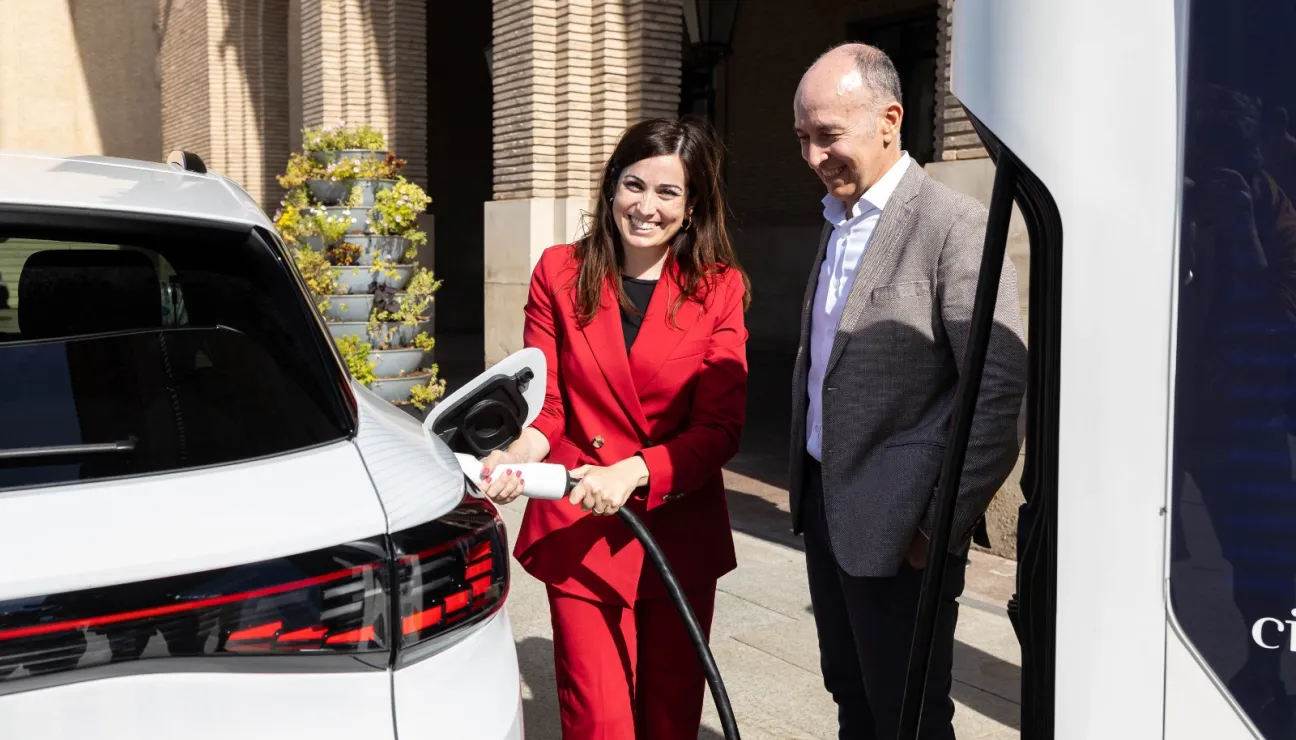Zaragoza paves the way for the future of wireless electric mobility with a new technology developed by CIRCE

The development is the latest milestone of the European project INCIT-EV, which has received funding of 15 million euros from the European Commission and a direct investment in the Aragonese capital of almost three million euros
Zaragoza continues to lead the transformation of urban mobility towards sustainability with the presentation of a revolutionary wireless electric charging technology, developed by the CIRCE Technology Center, within the framework of the European INCIT-EV project. This innovation will allow electric vehicles to charge without cables, even while in motion, marking a turning point in European urban transportation.
This advance is the latest milestone achieved within the European INCIT-EV project, which has just come to an end after four years of work, making Zaragoza a key setting for the research of inductive charging systems, both static and dynamic. The project has received 15 million euros in funding from the European Commission and has involved a direct investment of nearly three million euros in the city, which has made it possible to validate the feasibility of these technologies in real urban environments. Coordinated by CIRCE and in collaboration with Zaragoza’s city council, the assessment of the work carried out is “very positive.”
The Councilor for Environment and Sustainability, Tatiana Gaudes, emphasized Zaragoza’s position as a city “committed to the future of sustainable mobility, open to being a space where new technologies can be tested, which, in the near future, will become everyday elements for everyone. In this sense,” she added, “CIRCE is a strategic partner of the Zaragoza City Council, and it is always a source of pride and a guarantee to work alongside them on such projects.”
The Director General of CIRCE – Technology Center, Andrés Llombart, highlighted that “these cutting-edge technologies eliminate the need for cables and optimize the charging process through a safe and efficient system, designed to be integrated into existing urban infrastructures. With this initiative, Zaragoza takes a key step towards cleaner mobility and a more sustainable urban environment, where innovation and sustainability go hand in hand.”
Inductive wireless charging: efficiency and safety in service of mobility
One of the main achievements of the INCIT-EV project is the development of an inductive charging system for electric taxis. This system allows for up to 50 km of range to be recharged in just ten minutes, making it an ideal solution for urban fleets. Thanks to the installation of a cooled transmitter coil in the ground, vehicles can charge without cables and without the risk of overheating, providing greater safety and energy efficiency.
Additionally, a significant advance has been made with dynamic charging, allowing vehicles to charge while on the move at speeds of up to 130 km/h. This system, based on the installation of a cable under the asphalt, is particularly promising for long-distance travel, as it accelerates the transition to more sustainable transportation while significantly reducing stop times and operational costs.
Wireless and bidirectional inductive charging
Another key innovation of the project is the development of a bidirectional inductive charging system, installed outside Mobility City, in the Expo. This technology allows electric vehicles not only to charge wirelessly but also to act as mobile energy storage units, exchanging electricity with buildings and renewable energy sources. With a capacity of up to 25 kW, this solution helps balance energy demand, supporting grid stability, and creating new opportunities for integrating renewable energy in the city.

CIRCE is working on projects like the bidirectional charging system implemented in the Balearic Islands, the first of its kind in Spain. This pilot innovation project was inaugurated in Mallorca, alongside the Balearic Government, and marked the first implementation of V2G technology on an industrial scale in Spain, with enough scope to establish consumer behavior and usage patterns.
Leading the future of sustainable mobility
As a member of CharIN, the world’s most important association focused on developing and promoting a universal standard for electric vehicle charging, CIRCE is now working on the creation of regulations governing the interoperability of inductive charging systems across Europe, ensuring that these innovations can be replicated in other cities committed to climate neutrality.
These advances are essential for meeting the ambitious objectives of Zaragoza as one of the 100 Climate Neutral Cities by 2030. A commitment aligned with the goals set out in the Urban Agenda 2030 and the European Green Deal, supported by CIRCE as a technological partner.
Strategic collaboration between CIRCE and Zaragoza City Council
In addition to the INCIT-EV project in sustainable and efficient mobility, both entities are currently collaborating on other projects like JUSTStreets, which will reshape road infrastructure and change individual mobility behavior in 12 cities, including Zaragoza, or ELABORATOR, which aims to implement innovative solutions for safe, inclusive, and sustainable urban mobility, integrating smart tools, spatial redesign, and green transport in collaboration with users and authorities.
Other related news






